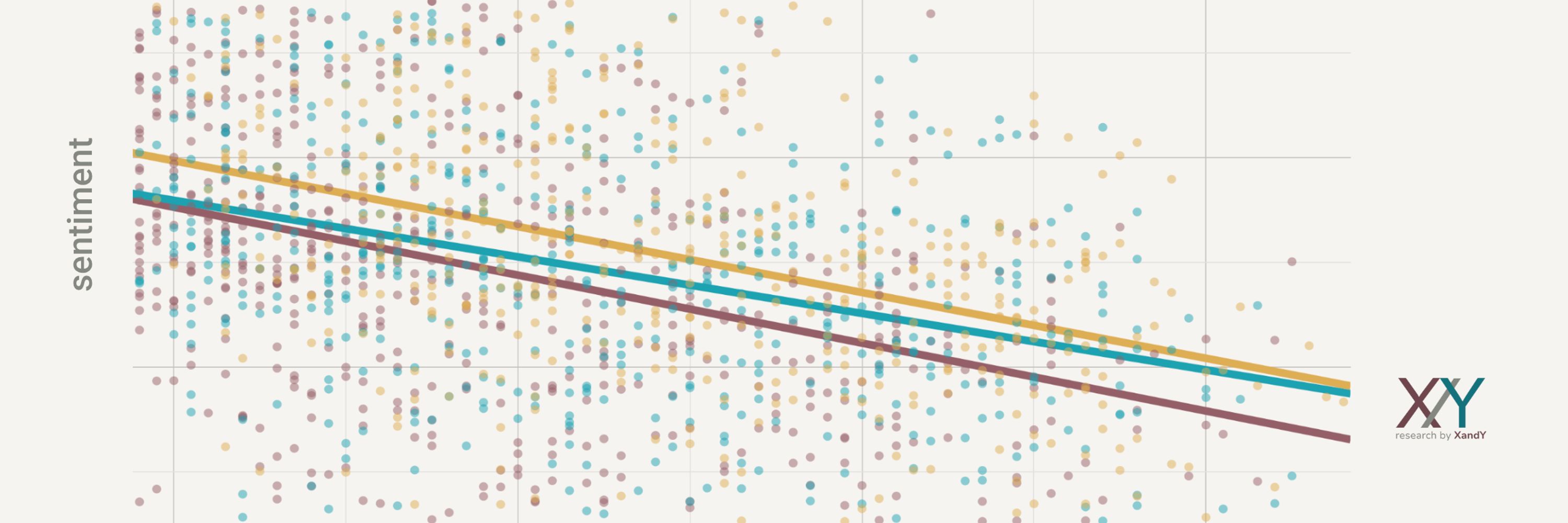
XandY
@xandyresearch.bsky.social
Founded by two Yale scientists, XandY is an independent research firm that helps accelerate the world's most important new ideas.
One of the main barriers to diffusion of innovations is simply a lack of knowledge. For example, our polling shows that support for allowing AV taxis to operate in your local area depends heavily on two core pieces of knowledge: 1) that AVs are already in use, and 2) that AVs are safer than humans.

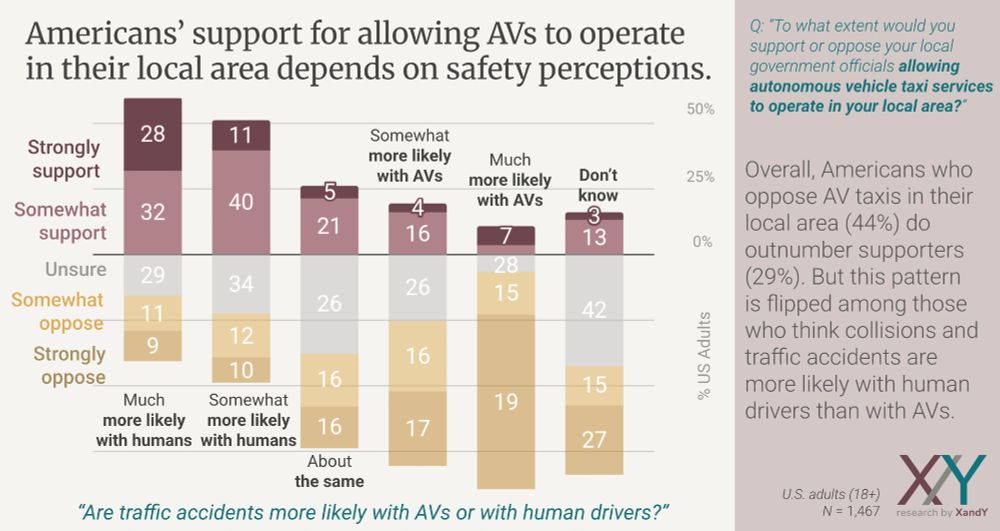
October 10, 2025 at 2:30 PM
One of the main barriers to diffusion of innovations is simply a lack of knowledge. For example, our polling shows that support for allowing AV taxis to operate in your local area depends heavily on two core pieces of knowledge: 1) that AVs are already in use, and 2) that AVs are safer than humans.
Despite AVs being far less likely than human drivers to be involved in an accident, a majority of Americans say their #1 ranked concern about AVs is still traffic accidents.
This gap between perception and reality will be a primary challenge on the road to mass scale AV adoption.
This gap between perception and reality will be a primary challenge on the road to mass scale AV adoption.

September 22, 2025 at 5:06 PM
Despite AVs being far less likely than human drivers to be involved in an accident, a majority of Americans say their #1 ranked concern about AVs is still traffic accidents.
This gap between perception and reality will be a primary challenge on the road to mass scale AV adoption.
This gap between perception and reality will be a primary challenge on the road to mass scale AV adoption.
Nuclear NIMBYs: Our new national poll finds that Americans' support for building new nuclear power outnumbers opposition IF it is built in a state where they do not live, BUT the pattern is reversed if it would be located within 50 miles of their home.
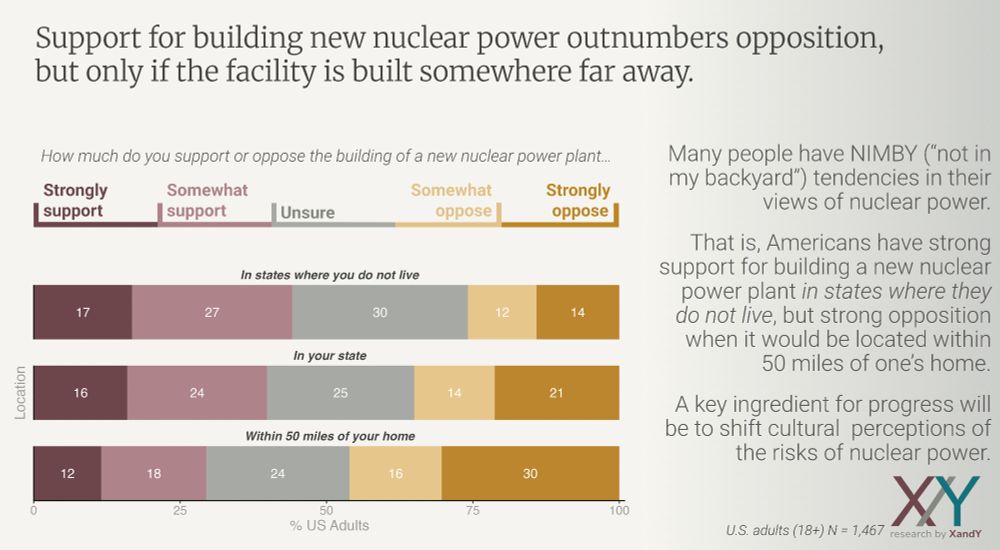
August 28, 2025 at 3:17 PM
Nuclear NIMBYs: Our new national poll finds that Americans' support for building new nuclear power outnumbers opposition IF it is built in a state where they do not live, BUT the pattern is reversed if it would be located within 50 miles of their home.
Are #AutonomousVehicles safer than human drivers? While the actual safety metrics matter a lot, another important determinant of diffusion and adoption is public perception of which one is safer. Our recent national study found that Americans are still about equally split on this.
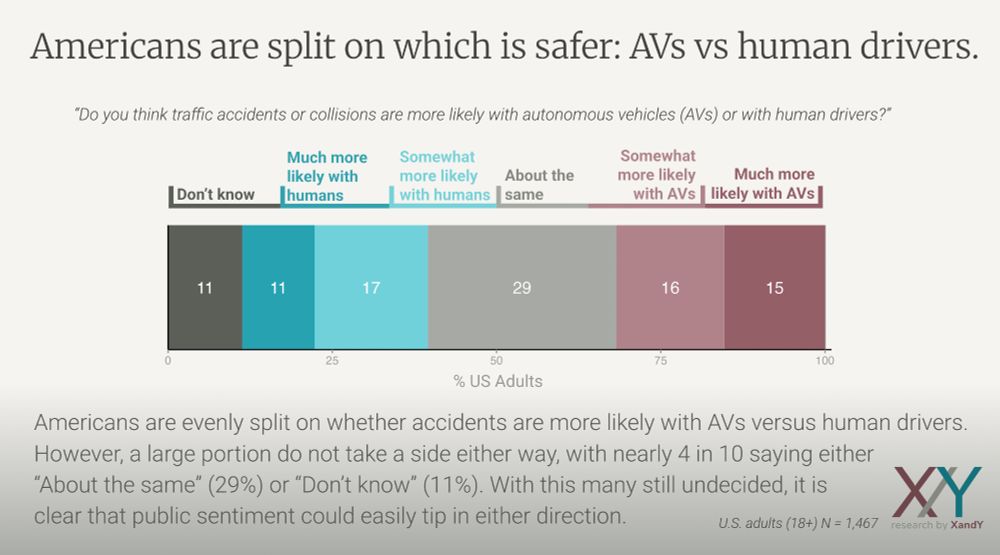
August 21, 2025 at 1:47 PM
Are #AutonomousVehicles safer than human drivers? While the actual safety metrics matter a lot, another important determinant of diffusion and adoption is public perception of which one is safer. Our recent national study found that Americans are still about equally split on this.
Nearly HALF of Americans (49%) are unaware that hashtag#AutonomousVehicles are already being used in real-world settings.
Data from our recent national study showed that only about 1 in 3 U.S. adults correctly estimated the current state of AVs (that they're being used in a few major cities).
Data from our recent national study showed that only about 1 in 3 U.S. adults correctly estimated the current state of AVs (that they're being used in a few major cities).

August 15, 2025 at 3:34 PM
Nearly HALF of Americans (49%) are unaware that hashtag#AutonomousVehicles are already being used in real-world settings.
Data from our recent national study showed that only about 1 in 3 U.S. adults correctly estimated the current state of AVs (that they're being used in a few major cities).
Data from our recent national study showed that only about 1 in 3 U.S. adults correctly estimated the current state of AVs (that they're being used in a few major cities).
Among Americans who have owned crypto, only a slim minority are aware that blockchain tech can be used for money transfers. Fewer than 1 in 3 are aware that uses include proof of ownership and contracts.

August 7, 2025 at 1:04 AM
Among Americans who have owned crypto, only a slim minority are aware that blockchain tech can be used for money transfers. Fewer than 1 in 3 are aware that uses include proof of ownership and contracts.
Do people who have never owned crypto plan to continue to avoid it?
Our national poll shows some clear answers to this. Although most Americans (81%) have never owned any digital assets, only HALF of that group (50.4%) says they are unlikely to acquire some in the future.
Our national poll shows some clear answers to this. Although most Americans (81%) have never owned any digital assets, only HALF of that group (50.4%) says they are unlikely to acquire some in the future.

July 31, 2025 at 7:41 PM
Do people who have never owned crypto plan to continue to avoid it?
Our national poll shows some clear answers to this. Although most Americans (81%) have never owned any digital assets, only HALF of that group (50.4%) says they are unlikely to acquire some in the future.
Our national poll shows some clear answers to this. Although most Americans (81%) have never owned any digital assets, only HALF of that group (50.4%) says they are unlikely to acquire some in the future.
It's going to be an uphill climb for autonomous vehicles.
In AAA's survey, only only 13% of U.S. drivers say a fully self-driving vehicle is important to them, where as 64% of want automatic emergency braking, and 59% want lane-keeping assistance.
newsroom.aaa.com/2025/02/aaa-...
In AAA's survey, only only 13% of U.S. drivers say a fully self-driving vehicle is important to them, where as 64% of want automatic emergency braking, and 59% want lane-keeping assistance.
newsroom.aaa.com/2025/02/aaa-...

AAA: Fear in Self-Driving Vehicles Persists
ORLANDO, FL (Feb. 25, 2025) – According to AAA’s latest survey on autonomous vehicles, 13% of U.S. drivers would trust riding in self-driving vehicles –
newsroom.aaa.com
July 24, 2025 at 3:44 PM
It's going to be an uphill climb for autonomous vehicles.
In AAA's survey, only only 13% of U.S. drivers say a fully self-driving vehicle is important to them, where as 64% of want automatic emergency braking, and 59% want lane-keeping assistance.
newsroom.aaa.com/2025/02/aaa-...
In AAA's survey, only only 13% of U.S. drivers say a fully self-driving vehicle is important to them, where as 64% of want automatic emergency braking, and 59% want lane-keeping assistance.
newsroom.aaa.com/2025/02/aaa-...
Q: When is a large number of people feeling merely "Neutral" actually a positive signal?
A: When this means there's very little opposition!
In our national poll, we found that 51% of Americans who have *never* owned crypto said they feel neither positive nor negative sentiment... just neutral.
A: When this means there's very little opposition!
In our national poll, we found that 51% of Americans who have *never* owned crypto said they feel neither positive nor negative sentiment... just neutral.
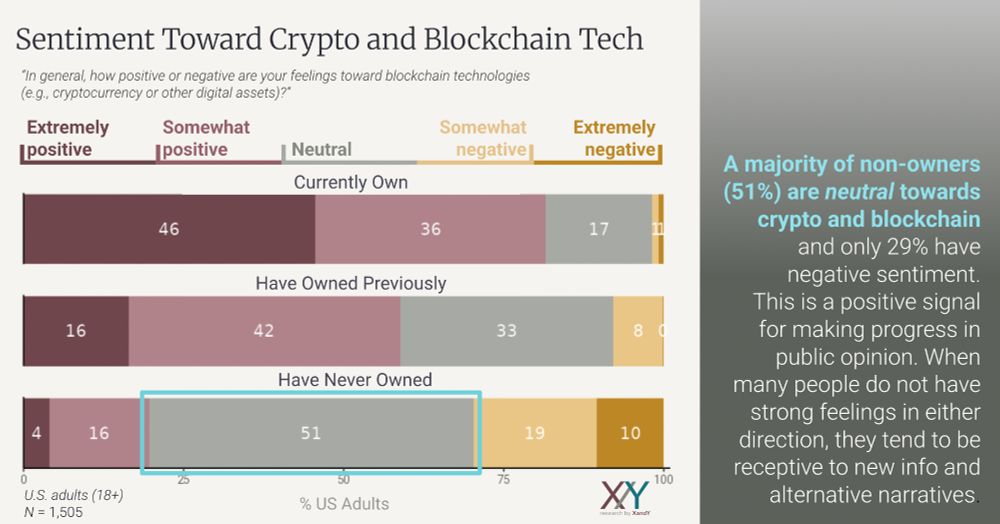
July 16, 2025 at 3:07 PM
Q: When is a large number of people feeling merely "Neutral" actually a positive signal?
A: When this means there's very little opposition!
In our national poll, we found that 51% of Americans who have *never* owned crypto said they feel neither positive nor negative sentiment... just neutral.
A: When this means there's very little opposition!
In our national poll, we found that 51% of Americans who have *never* owned crypto said they feel neither positive nor negative sentiment... just neutral.
Are younger Americans more likely to own crypto? The data says YES... but with an asterisk.
Typically with new tech, you'd expect younger people are more likely to participate. But in our national study, we see that ownership drops dramatically among adults under 25, despite peaking in ages 25-34.
Typically with new tech, you'd expect younger people are more likely to participate. But in our national study, we see that ownership drops dramatically among adults under 25, despite peaking in ages 25-34.

July 10, 2025 at 6:56 PM
Are younger Americans more likely to own crypto? The data says YES... but with an asterisk.
Typically with new tech, you'd expect younger people are more likely to participate. But in our national study, we see that ownership drops dramatically among adults under 25, despite peaking in ages 25-34.
Typically with new tech, you'd expect younger people are more likely to participate. But in our national study, we see that ownership drops dramatically among adults under 25, despite peaking in ages 25-34.
We have some work to do on public education about crypto.
Our new national survey in partnership with The Digital Chamber shows that most Americans are unable to identify any specific benefits or risks of crypto.
Our new national survey in partnership with The Digital Chamber shows that most Americans are unable to identify any specific benefits or risks of crypto.

February 19, 2025 at 3:13 PM
We have some work to do on public education about crypto.
Our new national survey in partnership with The Digital Chamber shows that most Americans are unable to identify any specific benefits or risks of crypto.
Our new national survey in partnership with The Digital Chamber shows that most Americans are unable to identify any specific benefits or risks of crypto.
hello world!
We've had an exciting few years working with private clients. As we launch our public work, our social accounts will distribute data and strategy to help further our mission:
--> accelerating diffusion of the world's most important new ideas and innovations.
We've had an exciting few years working with private clients. As we launch our public work, our social accounts will distribute data and strategy to help further our mission:
--> accelerating diffusion of the world's most important new ideas and innovations.

February 19, 2025 at 1:45 PM
hello world!
We've had an exciting few years working with private clients. As we launch our public work, our social accounts will distribute data and strategy to help further our mission:
--> accelerating diffusion of the world's most important new ideas and innovations.
We've had an exciting few years working with private clients. As we launch our public work, our social accounts will distribute data and strategy to help further our mission:
--> accelerating diffusion of the world's most important new ideas and innovations.

